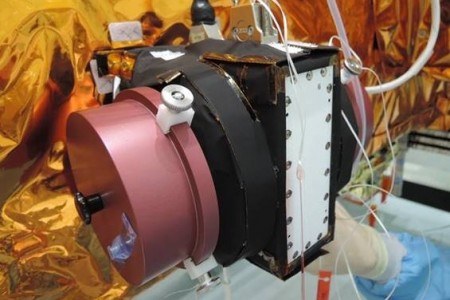In the wake of the CARMEN3 mission, the oceanic surveillance satellite JASON-3 initiated its scientific goal 4 years ago. The latter carries the AMBRE instrument, developed by EREMS, which is committed to have a better understanding of abnormal operations of satellites due to intense electron flows.
Feb. 20 -AMBRE celebrates it’s 4 years long activity of studying electrostatic risks for satellites


AMBRE spectrometer
AMBRE (Appareil de Mesure à Bord du Risque Electrostatique) is an electron and ion spectrometer. It measures the charging electron flow impacting the satellite and deduces the resulting satellite’s negative potential by measuring the acceleration of positive ions. The analysis of the satellite’s electrical responses enables to highlight the malfunctions already observed during former missions (PanAmsat-7, Temposat 6, NigComSat-1,…) and to assess the electrostatic risks.
After 4 years of service
After a necessary period of degassing required by high voltages present in the equipment, AMBRE delivered its first spectrum on February, 12th, 2016. AMBRE provided important statistics on irradiation times at auroral ovals and made the risks of charging assessment possible. Eventually, AMBRE will enable a better adaptation of the specifications for worst-case scenarios imposed in CEM (ElectroMagnetic Compatibility) and ESD (ElectroStatic Discharge).
EREMS cooperation with CNES and IRAP allowed AMBRE to show the capacity for technology transfer and cooperation between scientists and space SMEs.
